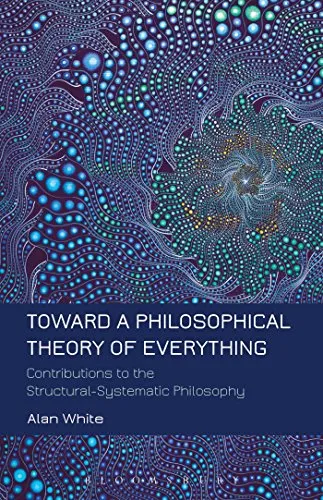Toward a philosophical theory of everything : contributions to the structural-systematic philosophy
4.0
Reviews from our users

You Can Ask your questions from this book's AI after Login
Each download or ask from book AI costs 2 points. To earn more free points, please visit the Points Guide Page and complete some valuable actions.Introduction
"Toward a Philosophical Theory of Everything: Contributions to the Structural-Systematic Philosophy" is a thought-provoking exploration of the intellectual framework that seeks to unify the diverse threads of philosophical inquiry under a cohesive and systematic structure. Authored by Alan White, this book delves deeply into the theory that philosophy—and human understanding as a whole—can be organized into a coherent system of interrelated ideas. By addressing critical questions about metaphysics, knowledge, ethics, and the nature of existence, the book lays the groundwork for what could be considered a philosophical "theory of everything." This text is especially valuable to those engaged in structural or systematic approaches to philosophy and will appeal to philosophers, academics, and general readers seeking clarity and comprehension in complex philosophical matters.
In this book, readers are guided through an ambitious intellectual journey. It challenges fragmented approaches to philosophy that often isolate disciplines and ideas into silos. Instead, it promotes the concept that philosophical topics are interconnected by underlying patterns and structures. This structural-systematic approach is not only a methodological innovation but one that aims to redefine how we think about the nature of human knowledge itself. Now, let us take a closer look at what this book has to offer.
Detailed Summary of the Book
"Toward a Philosophical Theory of Everything" is structured to guide the reader through several key areas of philosophy while integrating them into a larger, interconnected framework. The book begins by addressing foundational questions in metaphysics, such as the nature of being and existence. It explores whether reality can be understood in universal terms, emphasizing structural coherence as a necessary component of metaphysical understanding.
The text then shifts to epistemology, where it examines the structures of knowledge: how we know what we know, and how such knowledge can be systematically connected. By incorporating insights from contemporary science, logic, and language theory, the author demonstrates that philosophy need not exist in isolation from other disciplines. Instead, it has the potential to provide a unifying perspective.
Ethical and moral philosophy forms another essential part of the book, as it examines the relationships among values, obligations, and human purpose. The author argues for a structural approach to ethics that recognizes the systematic interplay of individual moral principles within broader societal frameworks.
Finally, the book concludes with implications for the philosophy of mind, cultural analysis, and even aesthetics, providing readers with an expansive, integrative vision of human thought—a true philosophical theory of everything. White's work is rigorous in its analysis but remains accessible to thoughtful readers outside the most specialized academic circles.
Key Takeaways
- Philosophy can and should strive to achieve unity by addressing its disciplines—metaphysics, epistemology, ethics, and aesthetics—as interdependent and structurally coherent.
- Structural-systematic philosophy is a methodological framework that redefines how we organize and interpret philosophical knowledge.
- Philosophical systems should not reject the advancements of science but instead incorporate them as part of a comprehensive understanding of reality.
- Through rigorous structure and integration, understanding transcendence becomes achievable in both practical and theoretical terms.
Famous Quotes from the Book
"To seek a philosophical theory of everything is not to seek the elimination of mystery, but rather to embrace the challenge of coherence in the face of complexity."
"All knowledge, if truly understood, is part of an interconnected web of meaning."
"The structural-systematic approach does not minimize human diversity; it finds unity in the diversity."
Why This Book Matters
Philosophy, in its modern academic form, often suffers from fragmentation, with individual thinkers or schools focusing narrowly on particular issues while failing to see the bigger picture. This book is significant for its attempt to unify the philosophical landscape under what can be aptly described as a systematic framework. This ambitious project seeks not just to clarify isolated ideas, but to create connections that show philosophy as a holistic endeavor.
Moreover, White’s work matters because it challenges contemporary philosophers, scientists, and thinkers to think beyond disciplinary boundaries. Where other books theorize without structure or remain content within isolated specialties, "Toward a Philosophical Theory of Everything" presents a structured philosophy that respects complexity while finding underlying unity.
In a world desperate for coherence amidst rapid intellectual and cultural fragmentation, this book is more relevant than ever. It invites its readers to step out of narrow specialization and engage with the full spectrum of human knowledge, making the case for philosophy as a timeless, unifying pursuit.
Free Direct Download
You Can Download this book after Login
Accessing books through legal platforms and public libraries not only supports the rights of authors and publishers but also contributes to the sustainability of reading culture. Before downloading, please take a moment to consider these options.
Find this book on other platforms:
WorldCat helps you find books in libraries worldwide.
See ratings, reviews, and discussions on Goodreads.
Find and buy rare or used books on AbeBooks.


